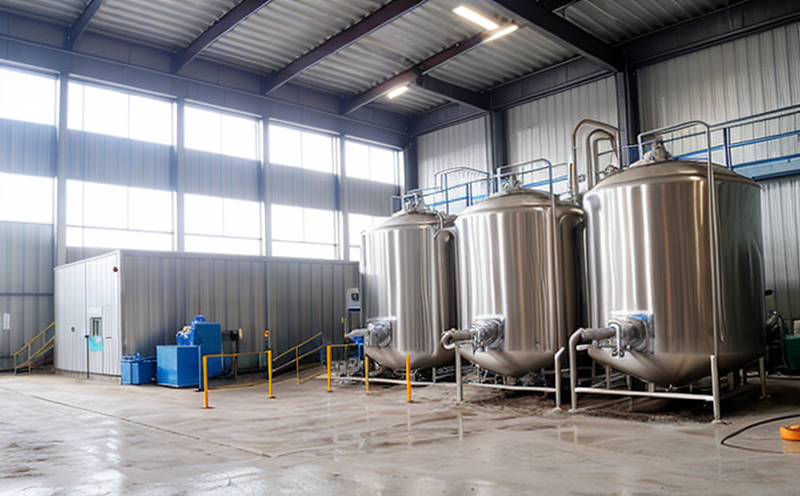ASTM D3869 Iodide Test in Industrial Water
The ASTM D3869 iodide test is a critical procedure used to determine the concentration of iodide ions (I-) present in industrial process water. This test ensures that the water quality meets specific standards, which are essential for maintaining product purity and operational efficiency in various industries such as pharmaceuticals, electronics, and food processing.
Iodide ion is a reactive species found naturally in water sources but can also be introduced through industrial processes or chemical additions. Excessive iodide levels can interfere with sensitive analytical methods used in quality control laboratories. Therefore, accurate measurement of iodide ions is crucial for maintaining compliance with industry standards and ensuring product safety.
The ASTM D3869 test method uses potentiometric titration to measure the concentration of iodide ions. This technique involves titrating a known volume of water sample with potassium dichromate solution (K2Cr2O7) until a color change occurs, indicating the endpoint of the reaction. The amount of K2Cr2O7 required to reach this point is directly proportional to the iodide ion concentration in the sample.
The test requires precise and accurate measurement techniques to ensure reliable results. Quality managers, compliance officers, R&D engineers, and procurement teams rely on these data points for decision-making purposes. The accuracy of the iodide test results plays a significant role in maintaining product quality and ensuring that all regulatory requirements are met.
For industries where water quality directly impacts process outcomes or product performance, the ASTM D3869 iodide test provides indispensable insights into the purity of industrial process water. This information helps in optimizing processes, reducing waste, and enhancing overall efficiency. By adhering to this standard, businesses can ensure that their operations are sustainable and compliant with international guidelines.
The importance of the ASTM D3869 test extends beyond just meeting regulatory requirements; it also contributes significantly to environmental protection efforts. Proper management of iodide ions in industrial wastewater helps prevent contamination of natural water bodies, which is a key aspect of corporate social responsibility initiatives.
Applied Standards
The ASTM D3869 test for iodide ion concentration is widely recognized and utilized across multiple sectors. This includes pharmaceuticals, electronics manufacturing, food processing, and other industries where the purity of industrial process water is paramount.
The standard provides a robust framework for measuring iodide ions using potentiometric titration. By adhering to ASTM D3869, laboratories ensure that their testing methods are consistent with internationally accepted practices. This consistency enhances reliability and credibility in test results, making it easier for stakeholders to trust the outcomes.
The use of this standard ensures that all parties involved—whether they be internal quality control teams or external regulatory bodies—are working towards a common goal. Compliance with ASTM D3869 helps maintain high standards of practice within the industry, fostering trust and collaboration among various stakeholders.
Additionally, adhering to this international standard allows companies to stay abreast of evolving best practices in water analysis techniques. As technology advances, so too do our methods for ensuring accurate measurement of iodide ions. By incorporating these updates into their testing protocols, organizations can continue providing reliable data that contributes positively to both internal operations and external relationships.
Customer Impact and Satisfaction
The ASTM D3869 test has a significant impact on customer satisfaction within the industrial sector. By ensuring accurate measurement of iodide ions in process water, companies demonstrate their commitment to maintaining high-quality standards throughout their operations.
Clients appreciate knowing that their suppliers adhere strictly to recognized international standards like ASTM D3869. This not only bolsters confidence but also fosters long-term partnerships based on mutual respect and shared goals. For example, pharmaceutical manufacturers rely heavily on clean water sources for producing medicines; any contamination could lead to costly recalls or safety issues.
In addition to enhancing customer trust, successful implementation of ASTM D3869 also reduces operational risks associated with improper handling or storage of iodide-containing materials. Proper management leads to fewer errors during production cycles and less waste generation, ultimately saving time and money for businesses while promoting sustainability goals.
Moreover, compliance with ASTM D3869 can help improve reputation among consumers who value transparency regarding environmental impact statements from companies they purchase products from. When customers see that a business follows rigorous testing protocols like those prescribed by ASTM D3869, it reinforces positive perceptions about how responsibly the company operates.
Competitive Advantage and Market Impact
The ability to accurately measure iodide ions in industrial process water provides a competitive edge for companies operating within industries that depend heavily on high-purity water sources. By demonstrating their commitment to quality through adherence to ASTM D3869, firms can differentiate themselves from competitors who may not prioritize such standards.
For instance, pharmaceutical manufacturers must ensure absolute purity in every step of drug production; even trace amounts of impurities could compromise the efficacy or safety of end products. By leveraging reliable iodide testing methods like those outlined by ASTM D3869, these organizations can build a reputation for excellence that attracts more loyal customers.
Adherence to this standard also opens up opportunities for collaboration with other industry leaders committed to maintaining similar standards. Such partnerships enable knowledge sharing and best practice exchanges across sectors, further enhancing overall performance within the marketplace.
In terms of market impact, companies that excel at implementing ASTM D3869 may see increased demand for their services or products due to heightened awareness about the importance of proper water treatment practices among consumers and regulatory bodies alike. This increased visibility can translate into greater market share and long-term profitability.





